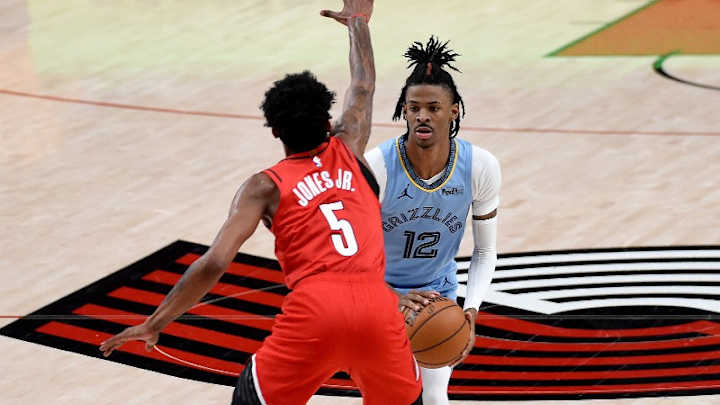Three Strategic Keys To Taming The Grizzlies

The Trail Blazers' biggest game of the season to date is their final matchup with the Memphis Grizzlies.
Portland enters Wednesday's action at 33-28, a game-and-a-half up on Memphis and the Golden State Warriors for seventh in the Western Conference. While the Blazers would obviously prefer to avoid the play-in tournament, the first step is not falling below eighth in the standings, ensuring they'd have to win just one game to advance to the playoffs.
What would be better if Portland can't catch the Dallas Mavericks? Securing the seven seed and owning home-court advantage in the "Seven-Eight Game," an outcome most easily accomplished by the Blazers putting more space between themselves and the Grizzlies. Memphis, remember, owns the head-to-head tiebreaker regardless of what takes place on Wednesday night.
Here are three key adjustments Portland can make to tame the Grizzlies.
Pick Up Ja Morant Early In Transition
There isn't a single engine behind Memphis' transition prowess. Taylor Jenkins knows his team's strengths, and encourages the Grizzlies to leverage their collective youth, athleticism and energy into the open floor as often as possible.
But no player on the roster embodies those traits more than Morant. He's an instant one-man fast break, capable of blinding rake and takes before finishing at the rim in highlight-reel fashion, spraying the ball to open shooters and cutters early in the shot clock as the defense resets and simply pitching ahead to open teammates when the opportunity presents itself.
There's only so much the opposition can do to slow down a multi-faceted transition attacker like Morant. But defenses can try and take away some of what makes Morant so dangerous in the open court, and identifying him early and putting a body on him immediately as the ball changes sides is the simplest solution.
Norman Powell needs to get his chest in front of Morant's as soon as possible here. You just can't let him build up a full head of steam in transition and get away with it.
Portland stressed transition defense after its first loss to Memphis, and promptly gave up 33 fast-break points on Sunday – four more than the previous game. Obviously, it'll take a team effort to keep the Grizzlies out of fast breaks. The Blazers' bigs can't amble down to the other end and Damian Lillard can't get caught complaining to referees in the backcourt.
The most important early work Portland can do to stymie the Grizzlies' transition attack, though? All it can to keep Morant from igniting it himself, and that means bodying him up in the backcourt.
Emphasize Damian Lillard Off The Ball
Lillard, clearly, isn't anywhere near his physical peak while battling a series of nagging injuries. He played with more verve in Tuesday's blowout of the Indiana Pacers than he had in recent games, but still lacked a degree of burst off the dribble.
Dillon Brooks is an absolutely dogged defender, with a cocksure attitude that sometimes lends itself to overzealousness. While that's often manifested in unnecessary personal fouls, Brooks is just as likely to cheat too far off his man away from the ball while chasing steals and deflections in Memphis' hyper-active scheme.
Needless to say, that's a death-knell against a shooter of Lillard's caliber.
The last two games against Memphis have proven that going at Brooks in ball-screen action or isolation isn't Lillard's best means of attack. He's just not fast or sudden enough right now to consistently get his shoulder past Brooks on the drive or create enough breathing space to comfortably launch for three.
The Blazers have plenty of ball handlers, of course, and targeting Morant with C.J. McCollum should be a two-way win for Portland anyway. Keeping Lillard's legs fresher while emphasizing his time spent away from the ball, especially on the second night of a back-to-back, is an added bonus.
Don't Be Afraid To Prioritize Small-Ball
Enes Kanter wasn't on the floor with Morant for a single second of Sunday's game. The Blazers learned their lesson from these teams' matchup less than 48 hours earlier, when the Grizzlies mercilessly involved Kanter in ball-screen action with Morant to painfully predictably results.
Terry Stotts confirmed afterwards that keeping Kanter away from Morant was a planned pre-game adjustment. It will no doubt carry over to Wednesday, but further limiting Kanter's playing time would be for the best, too.
Jaren Jackson Jr. didn't play on Sunday, remember, resting his surgically-repaired knee. But he's full-go for these teams' third meeting in five days, and given the availability of Jonas Valanciunas, will likely function solely as Memphis' backup center – ostensibly matching his minutes with Kanter's.
Jackson is on track to be one of the best seven-foot three-point shooters in league history. He nearly presents as many issues for Kanter as Morant when playing the 5.
Nurkic isn't all that much better an option on Jackson, either, but offers enough defensively otherwise to make a positive impact regardless. Kanter doesn't, which is why Stotts should be prepared to embrace small-ball when Nurkic heads to the bench, dusting off Rondae Hollis-Jefferson for extended minutes.
Switching most ball screens doesn't solve all the headaches Morant and Jackson give defenses. Any approach that naturally keeps the ball in front and minimizes open three-point attempts is always a good start defensively, though, especially compared to the problematic ripples of Kanter's presence.
